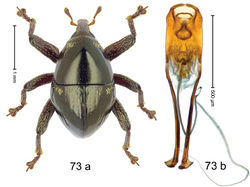Trigonopterus pseudosimulans
| Notice: | This page is derived from the original publication listed below, whose author(s) should always be credited. Further contributors may edit and improve the content of this page and, consequently, need to be credited as well (see page history). Any assessment of factual correctness requires a careful review of the original article as well as of subsequent contributions.
If you are uncertain whether your planned contribution is correct or not, we suggest that you use the associated discussion page instead of editing the page directly. This page should be cited as follows (rationale):
Citation formats to copy and paste
BibTeX: @article{Riedel2019ZooKeys, RIS/ Endnote: TY - JOUR Wikipedia/ Citizendium: <ref name="Riedel2019ZooKeys">{{Citation See also the citation download page at the journal. |
Ordo: Coleoptera
Familia: Curculionidae
Genus: Trigonopterus
Name
Trigonopterus pseudosimulans Riedel sp. n. – Wikispecies link – ZooBank link – Pensoft Profile
Diagnostic description
Holotype, male (Fig. 73a). Length 2.53 mm. Color of antennae ferruginous; legs dark ferruginous to black; remainder black. Body subovate; in profile broadly convex, dorsally flat. Rostrum dorsally punctate-rugose, with median subglabrous ridge; with sparse suberect yellow scales; epistome indistinct. Pronotum dorsally subglabrous with sparse minute punctures, anteriorly with small punctures and two patches of sparse recumbent yellowish scales; laterally above procoxa with coarse punctures. Elytra subglabrous with minute punctures, with two patches of sparse recumbent yellowish scales sublaterally near base; striae largely obsolete. Femora edentate; anteroventral ridge distinct, simple. Metafemur with dorsoposterior ridge simple, subapically without stridulatory patch, anterior surface coarsely rugose-punctate, each puncture with narrow recumbent scale. Abdominal ventrites 1–2 subglabrous, microreticulate; ventrite 1 behind metacoxa with angular protrusion, medially impressed; ventrite 2 flat; ventrite 5 swollen, subglabrous, punctate, at middle with shallow impression. Penis (Fig. 73b) with sides of body subparallel, apex rounded, with very few short setae; endophallus near ostium with 8-shaped sclerite; apodemes 2.3 × as long as body of penis; transfer apparatus simple, spiniform; ductus ejaculatorius with indistinct bulbus.
Material examined
Holotype (MZB): ARC2855 (EMBL # LN884938), C-Sulawesi Prov., Pendolo, Gn. Sampuraga, 02°12.476'S 120°45.506'E, 1050 m, beaten, 31-V-2012.
Distribution
C-Sulawesi Prov. (Pendolo). Elevation ca. 1050 m.
Biology
The species most likely inhabits the leaf litter of montane forest; the finding of the holotype on vegetation was probably exceptional.
Etymology
This epithet is a combination of the Greek prefix pseudo- (false) and the name of Trigonopterus simulans Riedel, a related species from New Guinea. A variable adjective.
Notes
Trigonopterus pseudosimulans Riedel, sp. n. was coded as “Trigonopterus sp. 421”.
Original Description
- Riedel, A; Narakusumo, R; 2019: One hundred and three new species of Trigonopterus weevils from Sulawesi ZooKeys, (828): 1-153. doi
Images
|
